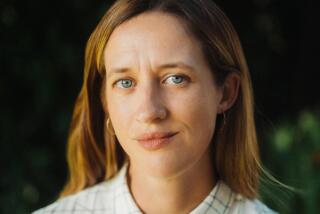The origin of Darwin
- Share via
Randal Keynes, 62, is the great-great-grandson of Charles Darwin. He is also the author of the book “Darwin, His Daughter, and Human Evolution,” inspiration for the new film “Creation,” starring Paul Bettany and Jennifer Connelly.
The film, which opened Friday and gets a wider release Jan. 29, is a heartbreaking biopic that explores Darwin’s life and loves and portrays him as more than a bit tortured by an irony in his family: Darwin (Bettany) was poised to go public on the origins of all life, including that of human beings, and his wife, Emma (Connelly), was a devout Christian who believed the only way to heaven was to trust in God.
Darwin struggled over whether to reveal his theories and how it would affect his family. His oldest daughter, Annie, who died at age 10, becomes his conscience in the film -- an apparition that helps and haunts him.
Keynes talked about the book, the film and his family’s stories about Darwin.
How did you come to write the book that inspired this film?
Darwin was always in the background, but after early childhood, I didn’t really pay much attention to him. . . until I was asked to help in the restoration of the home. I was asked if I could find out about Darwin’s life with his family, and I went to this chest of drawers. And in the back of one of the drawers I found this little writing case, which was Annie’s. . . . I found the box and saw there was a story there. I saw Darwin in a different way -- as a father who loved his daughter.
Did Paul Bettany portray Darwin the way you had imagined him?
Paul Bettany entered the character and brought him to life in a way I find compelling. Jennifer Connelly, in the same way, caught Emma’s spirit. And each of them used their familiarity with the other to give us a wonderful idea of how Darwin and Emma were so close to each other.
Darwin was obviously very conflicted over his science and the religious beliefs of his wife. Did this struggle show up anywhere else in your family?
Some of their children were Christian. Some of their children were agnostic. None were atheists. My great-grandfather was agnostic.
There was a time when this was an issue. Francis [Darwin’s third son] published a biography five years after Darwin died. It was written from Darwin’s letters he left behind that were meant to be private and for the family only; in them, [Darwin] writes that he was sure he couldn’t join Emma in her beliefs about the Christian religion and her commitment to Christian faith. So, there was an issue in the family that was between descendants who were agnostic and descendants who were Christian.
Is anyone else in your family a scientist?
Yes, my father is a biologist. And my brother is a biologist. Both are scientists at Cambridge University in England. My great-grandfather was an astronomer.
Your grandmother often shared her memories with you. Is there a particular story she told that sticks out?
My grandmother didn’t know Darwin because she was born eight years after he died. But she spent holidays with her grandmother Emma. And I spent holidays with my grandmother, who told me about going to Down House [Darwin’s home in Kent, England].
Down House was a very special place, because Darwin and Emma were very uncharacteristic of 19th century parents, giving the children freedom to enjoy themselves. . . .
One thing in particular was the staircase slide. It was a board of wood that was put on the staircase. Each of us had a cushion, and we would put the cushion on the slide and slide down the stairs at great speeds. We knew this had been a tradition, because in a letter from Emma [to one of the children], she wrote: “Your father has just had a slide made for the staircase.”
What else did you discover in your research at Down House?
In that chest of drawers, I also found all of Emma’s little pocket notebooks. . . . You can see in her little pocket notes about how Darwin is doing, if he is sick or doing better. You see in these notes how distressed he was.
The main things we know about Darwin and Emma are from their letters to each other. In each take, it is clear how deeply Emma cared about the issue we see in the movie. By Darwin’s inability to be part of the Christian faith, she feared their inability to be together for eternity, and not being with him in the afterlife.
Why do you think it is important for the public to know more about his personal life?
He was a very remarkable man in the way he did his science and the way he thought about the implications of it, before he gave it to the world. It is admirable, especially with an idea that he knew would be hard for most to accept. . . .
I hope when people see the film, they can see that this theory came from a humane, conscientious person whose ideas, which he thought through so carefully before publishing, should be taken very seriously.
I hope people take away a Darwin they didn’t know.
More to Read
Only good movies
Get the Indie Focus newsletter, Mark Olsen's weekly guide to the world of cinema.
You may occasionally receive promotional content from the Los Angeles Times.







